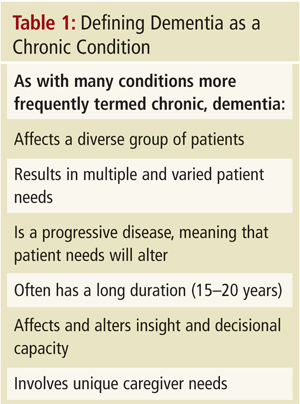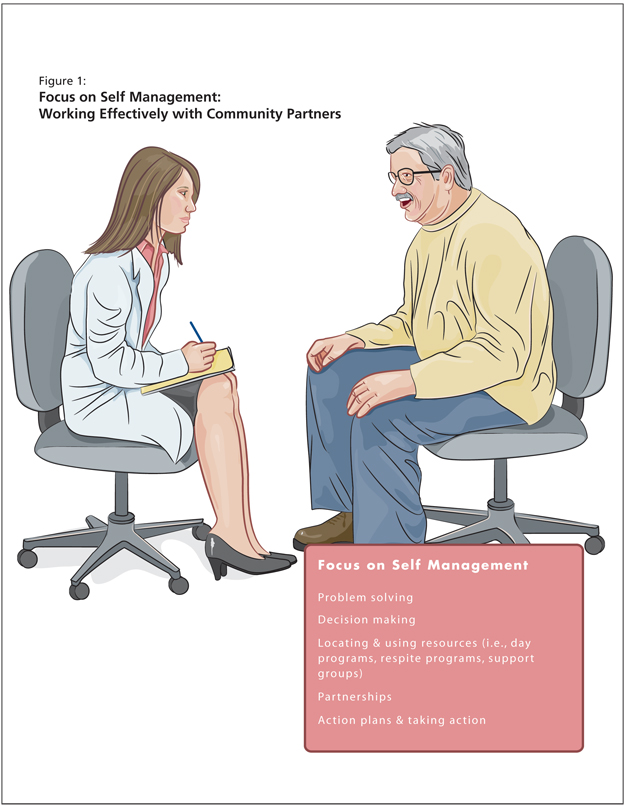Click here to view the entire report from the 4th Canadian Colloquium on Dementia
Working Effectively with Community Partners in Dementia Care
Speaker: Dr. Carole A. Cohen, MD, FRCPC, Associate Professor, Department of Psychiatry, University of Toronto; Clinical Director, Community Psychiatric Services for the Elderly, Sunnybrook and Women’s College Health Sciences Centre; Toronto, ON.
Dr. Carole Cohen, a geriatric psychiatrist and academic, explored the wider “systems issues” associated with providing care to individuals diagnosed with dementia. These individuals’ care needs cannot be met solely within primary care. The key question, according to Dr. Cohen, is who are the community partners that one should approach?
Dr. Cohen described a pivotal shift in the conceptualization of dementia care that accompanies viewing the condition as a chronic disease. When dementia is considered a chronic condition (as outlined in Table 1), one may think more laterally and flexibly about the diversity of potential care needs, and about creating key partnerships-be they clinician/clinician partnerships or clinician/community partnerships. Such alliances can compensate for the challenges encountered in managing dementia in primary care.

Patient Needs
Patient needs are likely to include information on their diagnosis and appropriate course of treatment, educational information, supportive resources, psychological care, and decisional support as impairment increases. Inherent to the challenge of providing for these needs is that they will vary among a diverse patient population. Needs should also accord with dementia type and be tailored to each syndrome.
Many clinics are not equipped to address the full range of patient needs, and that, according to Dr. Cohen, is where community alliances help fill the breach.
Caregiver Needs
“What’s good for caregivers is good for patients,” asserted Dr. Cohen. If clinicians can help caregivers to mobilize social support, formal and informal, patient needs will also be met. The objective in meeting caregiver needs-which include education and information, social support, and assistance in mobilizing that support-is to fortify the wider circle of care around the individual with dementia.
Dr. Cohen noted that entities such as day programs, respite programs, and support groups are underused. Not only may caregivers be unaware of them, but many people do not think of themselves as caregivers and therefore do not seek out such support. They may see themselves simply as a son or daughter aiding an ailing parent. Such individuals, however, are at high risk for burnout. As Dr. Cohen described, what helps caregivers to avoid depression and burnout, will allow them to cope longer and better assist the individual with dementia. Research has shown the effectiveness of individualized plans, plans that have multiple strategies, training, information, and ongoing relationships-for the dementing illnesses may last 15 or 20 years.
Putting Dementia Care in Context
Given the foregoing, Dr. Cohen questioned how traditional care models will help the burgeoning dementia population. Dr. Cohen asked the audience to consider the broad context of dementia care. She urged listeners to “think beyond hospital walls,” to be cognizant of the “vast literature” on chronic care across many illnesses/conditions, and to recognize that many tenets for other models (diabetes, for example) will work for dementia.
An interesting model for dementia from chronic disease management is termed the “prepared practice team,” a multidisciplinary team aimed at providing broad psychosocial interventions. Supplemental strategies such as the creation of e-records, interchange of information, and coordination of team care result in an informed and empowered patient and family.
Borrowing from the Chronic Care Model
Two key parts of the chronic care model Dr. Cohen encouraged listeners to consider were facilitating self-management support and community resources (Figure 1).

Self-management could better support patients with dementia as well as their families. Self-care complements the care provided by the professional team and facilitates training to cope with the debilitating aspects of dementia, as well as promotes the use of decisional aids. Actively involving patients in their care is empowering when facing a disease bound to erode their problem-solving and decision-making capacities. Patients should be assisted in locating and using available resources and partnerships.
Disease self-management empowers individuals to become more actionable. Self-management mobilizes support, and this idea has led to the creation of programs such as cognitive memory rehabilitation services. The key, Dr. Cohen stated, is finding community resource partners to promote this kind of action. She advocates the use of case managers and family health teams. Clinicians need to ask what they can do to focus on and promote those community partnerships. Dr. Cohen used the example of an FTD daycare program at Baycrest Centre in north Toronto; she lamented that many dementia care programs are developed but underused. Patients and their caregivers need clinician encouragement to avail themselves of community programs.
Dr. Cohen suggested that clinicians might partner with caregiver resource centers, Alzheimer’s groups, and similar organizations.
Practical Suggestions for Clinicians
Dr. Cohen offered concrete suggestions for clinicians working with patients with dementia. She again advocated adopting the chronic care model for dementia. She urged them to work to better identify patient-caregiver needs. Identifying community partnerships, such as with “Meals on Wheels,” will facilitate patient care. She also urged clinicians to integrate case managers to serve as the “glue” connecting the levels of support and care.
Dr. Cohen concluded with Canadian examples of the kind of chronic care principles and community partnering she advocated. She described the FirstLink program, which is being implemented across Canada. This program provides an individual with a new dementia diagnosis a direct referral to a FirstLink clinic, which in turn gives the Alzheimer’s Society permission to call and offer available programs, services, and training. She described the founding of this program as a boon to busy MDs.
Regional networks and programs, such as the coordination of care between the Alzheimer’s Society and geriatricians in Prince Edward Island, as well as the networks of the British Columbia-based dementia clinics and community partnerships, stood out for Dr. Cohen as the kind of interventions beyond clinic walls that serves patient needs. She encouraged listeners to continue to think in these new directions, as the extent and gravity of the dementing diseases will demand the utmost of the health care system.